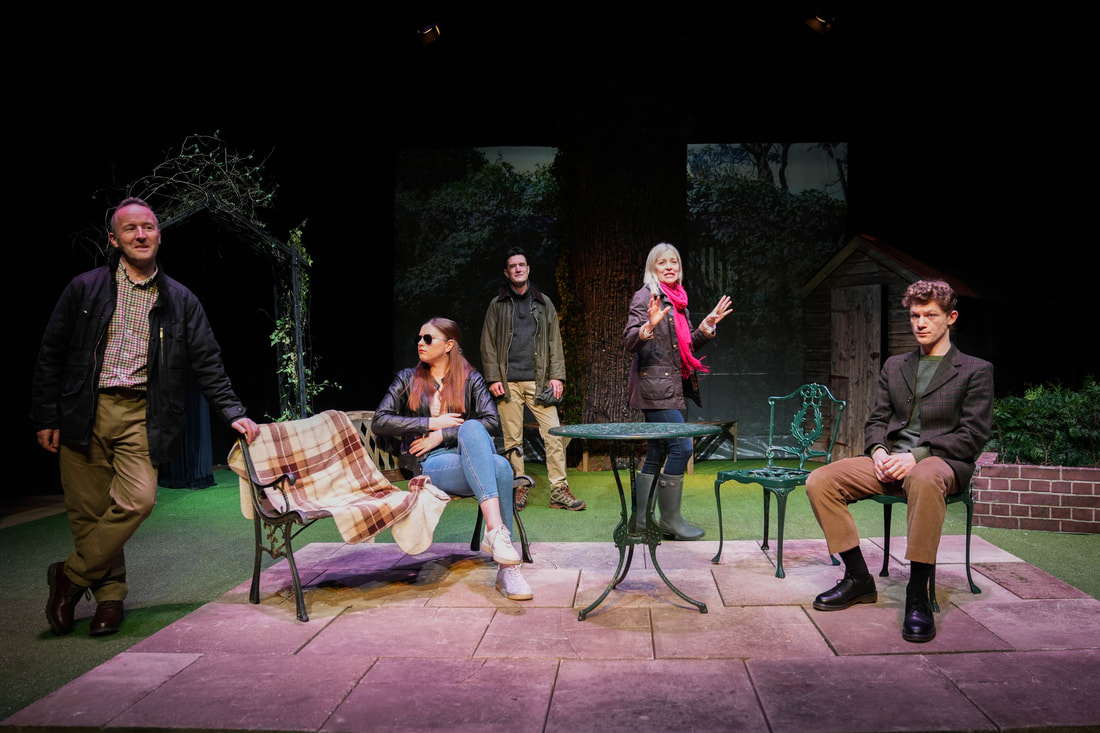|
‘Albion’ by Mike Bartlett
The Guildburys at the Electric Theatre, Guildford 23rd —26th March 2022 The Guildburys carry off a complex performance: more than social comment, this is an evening about romance, loss and reality. In Albion Mike Bartlett adopts a Chekovian approach to plot and emotional theme, reminiscent of The Cherry Orchard, where a rural setting and its inhabitants are portrayed with an allegorical undercurrent. We meet Audrey Walters (Cheryl Malam), a wealthy middle-aged entrepreneur who has bought a stately pile fallen into disrepair, and who is determined to restore its gardens to the glory that she remembers from her childhood, when she spent idyllic holidays there with her uncle, who then owned it. She expects her weak, complaisant husband Paul (Jonathan Constant) and her disaffected teenaged daughter Zara (Sophie Walker), to fall in with her plans without compromise. Paul loves her enough to comply; Zara longs to be free to grow, and to return to London. Consultation is foreign to Audrey’s modus operandi; this character is consistently strident, self-centred and unempathetic towards everyone around her, including Anna, the partner of her dead son. She destroys Zara’s self-esteem and creative aspirations along with the girl’s lesbian affair with her own old friend, Katherine (Gilly Fick). Her single-minded fixation on her vision of a vanished past takes priority over all other considerations: she is willing to sacrifice all else for it. The play was first performed in 2017, during the hiatus between the Brexit referendum and subsequent diplomatic negotiations aimed at fulfilling the ‘Leavers’ dual aspirations to ‘restore’ British culture to the status of an imagined historical ideal and at the same time to create vibrant change. Audrey’s garden project results in her alienating everyone close to her (except Paul) as well as her neighbours in the community, through her selfish, possessive and ungenerous behaviour. But if you’re expecting overt political comment, you won’t find it here. I came away from this complex play with the sense that it was a portrait of a central character embodying much of the worst of English moneyed class entitlement and arrogance, who spreads destruction while believing that she is being creative. Loss, grief and broken relationships result from her inability to consult with others or to accept changes that are beyond her control. In the dialogue there’s wit and telling references to the realities that Audrey’s rigid mindset is discounting: for example, climate change means the garden’s flower beds can’t be restored to their original plan; her son’s death in Afghanistan, which she frames as a glorious patriotic sacrifice, is seen to have been pointless in the light of subsequent events there. Cheryl Malam sustains stridency and controlling self-possession throughout the play; it is hard to feel sorry for Audrey when in the last scene she insists that she will ‘go on’: we see how her attitudes will lead to further losses and alienations. However much we dislike her, she is a tragic hero in the dramatic sense. Jonathan Constant lends an endearing mildness and humour to the character of Paul. As the two ‘old retainers’, Barbara Tresidder and Kim Fergusson lighten the relentlessly tense atmosphere among the family members; Claire Howes as the bright, assertively self-confident Polish cleaner/entrepreneur is an effective foil for Audrey’s self-indulgent romanticism and Zara’s unhappy search for a meaningful role in life. Gilly Fick is colourful and strong as Katherine, Audrey’s old friend who offers Zara a role as a creative lesbian partner and whom Audrey forces to her will —and loses. Janice Dempsey
0 Comments
|
Archives
March 2024
Categories
All
|

 RSS Feed
RSS Feed